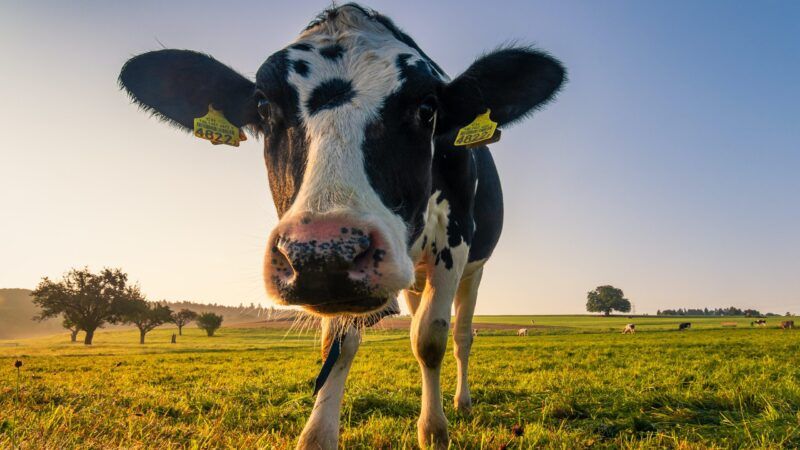California Court Rules Vegan Creamery Has First Amendment Right To Call Products 'Butter' and 'Cheese'
Who thought it was a good idea to give the government control over marketing?
On August 11, the U.S. District Court for the Northern District of California ruled in favor of Miyoko's Creamery in its lawsuit against the California Department of Food and Agriculture (CDFA), upholding the company's First Amendment right to use terms like butter and cheese in marketing its vegan products.
Based in Sonoma County, California, Miyoko's Creamery produces artisanal vegan alternatives to traditional dairy products. In just over five years, its popularity has exploded with distribution in Whole Foods, Trader Joe's, and other major supermarket chains.
The company is known for its popular vegan butter made from cashews, coconut oil, and sunflower oil, as well as other high-end alternative products like vegan mozzarella, cream cheese, and cheese wheels—all of which I can attest are very good.
Last year, the company received a threatening letter from the CDFA demanding it alter its marketing in the state. Although its labels clearly read "cultured vegan butter," the department requested the creamery stop using dairy-related terms on its packaging altogether, claiming Miyoko's marketing was in violation of the U.S. Food and Drug Administration's labeling regulations.
California ordered the company to remove the terms butter and cheese and cease to refer to its products as "lactose-free," "hormone-free," or "cruelty-free." Instead, the state suggested that Miyoko market its vegan butter as oh-so-appetizing "cashew cream fermented from live cultures." To do so would require an inordinate investment to produce custom packaging for sale of the product in California.
The letter doubled down by also ordering the company to scrap its mission statement, "Revolutionizing Dairy with Plants," and to remove an image of a woman hugging a cow from its website. The photo in question is that of a volunteer at a nonprofit refuge for farm animals, Rancho Compasión, which was started by the creamery's founder Miyoko Schinner.
At the forefront of the burgeoning movement toward ethical and sustainable alternative foods, Schinner was shocked by the letter, saying, "California is supposed to be an innovative and progressive state, and yet they are putting up roadblocks that could harm innovation."
Nonetheless, the meat and dairy industries and their lobbyists insist that terms like cultured vegan butter and plant-based cheese confuse consumers who are not seeking vegan products. Similar moves to police marketing of vegan and vegetarian products have been made around the country, including in Mississippi, Arkansas, Texas, and Louisiana.
Miyoko's Creamery filed its lawsuit against the CDFA in February 2020. The company was represented by co-counsels Deepak Gupta and Neil K. Sawhney of the Animal Legal Defense Fund (ALDF), which "has been at the forefront of demanding and enforcing fair regulation of plant-based foods."
According to a statement from the company's legal team, the lawsuit argues that "the CDFA's enforcement position is an attempt to unconstitutionally censor truthful commercial speech, violating Miyoko's First Amendment right to free speech." This month, Judge Richard Seeborg of the U.S. District Court for the Northern District of California agreed.
In his August 11 ruling, Seeborg found the creamery's marketing tactics to be truthful and upheld the company's First Amendment rights to label its products as vegan alternatives to traditional dairy. Seeborg also pointed out a major hole in the state of California's argument: There was no evidence of consumer confusion or marketing deception.
"The state's showing of broad marketplace confusion around plant-based dairy alternatives is empirically underwhelming," he said. "Nowhere, for instance, does the state present testimony from a shopper tricked by Miyoko's vegan butter, or otherwise make the case for why Miyoko's substitute spread is uniquely threatening to the public."
The ruling marks a major victory for free speech and free markets in the vegan space. According to ALDF Executive Director Stephen Wells, the decision also chips away at the corrupting power that industry lobbyists wield over governmental agencies.
Indeed, California is by far the largest source of dairy in America, producing 41.3 billion pounds of milk in 2020 alone. But the rise of vegan products has proved swift and threatening. As the market shifts toward dairy alternatives, the traditional dairy industry and its lobbyists have been reactive.
"The CDFA's attempt to censor Miyoko's from accurately describing its products and providing context for their use is a blatant example of agency capture," Wells said in a statement. "The fact that animal-milk producers fear plant-based competition does not give state agencies the authority to restrict one industry in order to help another."
Schinner is confident that the ruling will fortify the burgeoning vegan industry that is providing sustainable and ethical alternatives to traditional animal products. "Food is ever-evolving, and so too should language reflect how people actually use speech to describe the foods they eat," she said in an ALDF press release. "We are extremely pleased by this ruling and believe that it will help set a precedent for the future of food."



Show Comments (164)